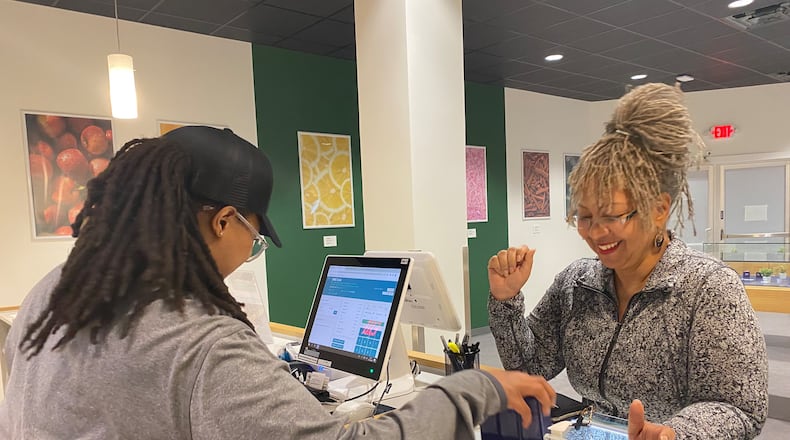What was once known strictly as a stoner’s holiday, 4/20 has taken on a more elevated meaning — a day of wellness, self-care and intentional rituals.
“People are realizing cannabis isn’t just about getting high,” cannabis culinary expert Vanessa Lavorato, author of “How to Eat Weed and Have a Good Time,” told The Atlanta Journal-Constitution. “It’s about feeling better, more present, and in control of your body.”
But with so many new products on the market, understanding what you’re consuming is key. Not all cannabis is created equal — and terms like CBD, delta-8 and THC can get confusing fast.
Know your cannabinoids
Before you bite into a brownie or pop a gummy, it’s worth understanding the compounds at play:
- CBD (Cannabidiol): A non-psychoactive cannabinoid, CBD is known for its calming, anti-inflammatory properties. It won’t get you high, but it may help with anxiety and sleep.
- Delta-8 THC: Nicknamed “diet weed,” delta-8 is a psychoactive compound typically synthesized from CBD. It provides a milder high than delta-9 THC (the classic compound in marijuana) but it’s less regulated, which raises safety concerns.
- THC (Delta-9 Tetrahydrocannabinol): The main psychoactive ingredient in marijuana, THC is what gives users the classic euphoric “high.” It’s still federally illegal in the U.S., though 24 states have legalized it for recreational use (it remains illegal in Georgia).
Is THC safe to consume?
That’s where things get hazy.
“Cannabis works with our endocannabinoid system (ECS), the same system that regulates sleep, mood and stress,” Lavorato said. “We literally have receptors for it throughout our bodies.”
The ECS also plays a surprising role in memory and learning. THC is known to temporarily disrupt short-term memory which, according to experts, may not be a downside. In “The Botany of Desire,” author Michael Pollan suggests that forgetting is essential to mental clarity — and that cannabis may help filter out unnecessary information. That idea has sparked interest in cannabis as a potential treatment for PTSD and other trauma-related conditions.
Still, questions remain. “If people are finding relief from cannabis, great. But is it safe? We think so, but we don’t know,” Dr. Heather Hirsch, a menopause expert at Brigham and Women’s Hospital, told Harvard Health.
Part of the problem is access. Cannabis remains a Schedule I drug under federal law, making it difficult for researchers to study real-world products. Reclassifying it as a Schedule III substance would ease those restrictions and allow for more licensed growers. But access isn’t the only issue.
“Without significant funding, we won’t close the critical knowledge gap on cannabis’ risks and benefits,” Cindy Kiel, associate vice provost for research at Stanford University, told the Association of American Medical Colleges.
While there’s growing evidence supporting cannabis for conditions like epilepsy, chronic pain and menopausal symptoms, experts agree that more long-term, unbiased research is still needed.
What about CBD?
Unlike THC, CBD is not classified as a controlled substance — making it widely available in everything from serums to sleep gummies. But that accessibility comes with a catch.
“There is a still a lot of uncertainty, and we are yet to receive the official guidance from the National Institute for Health and Clinical Excellence on the use of cannabis-based products for medicinal purposes,” Dr. Hazel Wallace, a nutritionist, former NHS physician and founder of The Food Medic, told Women’s Health. “These products are not regulated as medicines or drugs so do not undergo rigorous checks.”
Dr. Chandni Hindocha, a clinical psychopharmacologist, agrees. “We still don’t know exactly how CBD works in the brain,” she told the publication. “But it can act on over 65 different neurotransmitter receptor sites.” These include CB1 and CB2 cannabinoid receptors, serotonin receptors (which influence mood) and GABA receptors, which help regulate the nervous system. That may explain, according to Hindocha, why CBD is touted as a remedy for everything from anxiety to acne.
Credit: NYT
Credit: NYT
A new kind of self-care ritual
From skin care to sleep aids, cannabis products are becoming a staple in wellness routines. Here are a few elevated ways to celebrate 4/20:
- Try an infused dinner party: Lavorato swears by potlucks where everyone brings a responsibly dosed dish. “It’s like a dinner party with a built-in good time. You connect, you laugh, you eat great food, and no one wakes up with a hangover.”
- Cheers to no booze: Nowadays brand THC-infused Spirits are a modern alternative to alcohol. Its bottled spirits come in multiple dosing options, and its canned cocktails — available in flavors like Spicy Lime and Berry.
- Glow from within: Beyond Body Oil from Prima is a hemp-powered remedy for dry, stressed skin. With 600mg of organic CBD, squalene, magnesium, and botanicals like helichrysum and jojoba, this lightweight oil nourishes, balances, and helps protect skin from environmental stressors. Think of it as a skin-loving ritual in a bottle — perfect post-bath or pre-bed.
- Sleep better: Treadwell Farms’ Sleep CBD Gummies combine Florida-grown full-spectrum hemp with natural pineapple extract. With CBD, CBN and a microdose of THC, they’re designed to support your body’s natural sleep cycle with no groggy aftermath.
So whether you’re tincturing CBD under your tongue or sipping a THC-infused mocktail, approach with intention and celebrate responsibly.
Find more stories like this one on our Pulse Facebook page.
About the Author
Keep Reading
The Latest
Featured





